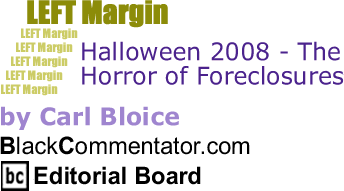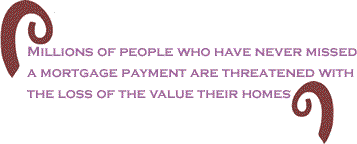
|
|||||||||||||||||||||||

|
|

Custom Search
|
|
 |
|
As Halloween neared in 2006, the looming mortgage crisis was already apparent and now two years later the horror of it all hasn’t gone away. It keeps getting worse. We’ve spent the last few months talking about the possibility that two million people might lose their homes by early next year. Now it turns out the total for this year and the next could turn out to be more six million. August saw a record number of homeowners in distress, over 300,000 homes were at some stage of mortgage default and 91,000 families or individuals lost their homes, Further, about 12 million homeowners – one out of every six - are reported to have zero or negative equity in their homes. An estimated 7,000 people are losing their homes every day. The number are scary enough but it’s not hard to imagine the fear and anxiety that grips the individuals and families that have lost, or are about to lose, their living space and with it – for most – their financial resources built up over their working lives. Millions of people who have never missed a mortgage payment are threatened with the loss of the value their homes. As economist Dean Baker recently noted, “A whole cohort of workers is now facing retirement with no wealth.” “The
landscape looks like the
And,
it’s not just homeowners that are affected. When the sheriff in
Without
question, everybody – homeowners, renters and the dispossessed --has
a stake in the efforts to stave off a further deterioration in the
country’s economy. Still, we must look on with dismay as official
As the powers-that-be steadfastly fail to summon up the political will (courage) to effectively confront the foreclosure crisis, efforts are being stepped up to divert attention from its actual cause and direct blame away from those responsible. The most pernicious of these efforts is the assertion that working class people of color are responsible for the situation.
“It might even seem bizarre given the fact that millions of desperate men and women signed onto utterly manipulative, usurious, ‘creative’ mortgages during the sub-prime gold-rush years, and, as a result, ended up losing what little capital they had accumulated over lifetimes of hard work as well as losing the roofs over their heads. To stretch a point, one could even view such a suggestion as offensive, since so many banks got into trouble by bundling mortgage securities that only preserved their value and generated profits so long as enough poor people signed on for the ride and agreed to be screwed.” But it’s even more pernicious than that. Every since I begin writing about mortgages and foreclosures two years ago, I have received warnings from readers that some people were trying to blame African Americans and other people of color for the mortgage mess. Over time, the spread of that racist canard has picked up steam. In the final days of the Presidential campaign it has become standard fare in propaganda of the political rightwing and the Republican Party. Through some strange demented logic, some on the right have tried to blame the economic meltdown on immigrant workers. Let’s be clear: working class African Americans, Latinos and Asians are not the source of this crisis; they are its victims. The perpetrators of the massive con game played with the nation’s economy at stake are the banks and mortgage companies and the agencies of government that encouraged them in their nefarious activity. President Bush was only partly right; the country didn’t “build too many houses,” it built more houses than people could afford and the only way to get people to purchase them was to entice or trick them into credit arrangements that could not be sustained.
And make no mistake about it, black people were targeted for “subprime” mortgages. Even when they could afford better loan terms they were often directed toward the riskier variety because these were more profitable for the creditors and their agents. “Let's get real here,” wrote Abramsky. “People borrowed because they were presented with offers they couldn't refuse. They were told that home ownership was the path to prosperity, and, like everyone else, they wanted their chance to realize their dreams. When they held back from buying property, they found the decks stacked against them. The same people who urged deregulation of the mortgage industry also lobbied for an end to rent controls and curtailments of government-funded public housing.” Did some people sign up for loans they had no intention of repaying? Yes. Did some people take out risky mortgages for on property they didn’t inhabit for speculative reasons (something that was also touted as a smart move)? Yes. Did some people say yes to the wink and nod of the mortgage brokers who agreed to don’t-ask-don’t-tell transactions, which were laughingly called “liars’ loans” by the people in the real estate offices? Yes, but they are a tiny portion of the people who, today, see their total personal wealth being foreclosed on. Blaming the millions of individual and families facing foreclosures for their own plight is obscene. It has begun to dawn on some people that ironic as it may seem, coming to the aid of those facing foreclosures and evictions is a mandatory step in staving off any further collapse the nation’s economy.
“If a quick consensus is required, why not include provisions to stop the source of bleeding, to aid the millions of Americans that are losing their homes?” wrote economist Joseph Stiglitz October 1 in a TheNation.com article: “Here's a Better Bailout Plan.” “Why not spend as much on them as on Wall Street? Do they still believe in trickle-down economics, when for the past eight years money has been trickling up to the wizards of Wall Street? Why not enact bankruptcy reform, to help Americans write down the value of the mortgage on their overvalued home? No one benefits from these costly foreclosures.” “It’s unacceptable that lawmakers have yet to come out squarely in favor of bold homeowner relief in the bailout bill,” The New York Times said editorially last month as the Department of the Treasury bailout bill was making it torturous way through Congress. “Secretary Henry Paulson, the biggest advocate of bailing out Wall Street, is also a big roadblock to helping hard-pressed borrowers. He wants to keep relying on the mortgage industry to voluntarily rework troubled loans, even though that approach has failed to stem the foreclosure tide - and does a disservice to the taxpayers whose money he would put at risk in the bailout.”
“We could make a strong moral argument that the government has a greater responsibility to help homeowners than it does to bail out Wall Street. But we don’t have to. Basic economics argues for a robust plan to stanch foreclosures and thereby protect the taxpayers’ $700 billion investment.” “Millions of Americans are losing their homes. (Already, some 3.6 million have done so since the subprime-mortgage crisis began.), notes economist, Joseph Stiglitz, in a very illuminating article in the November edition of Vanity Fair magazine. He goes on to write, “Financial markets produced loans and other products that were so complex and insidious that even their creators did not fully understand them; these products were so irresponsible that analysts called them ‘toxic.’ Yet financial markets failed to create products that would enable ordinary households to face the risks they confront and stay in their homes.” And, “Throwing the poor out of their homes because they can’t pay their mortgages is not only tragic - it is pointless. All that happens is that the property deteriorates and the evicted people move somewhere else. The most coldhearted banker ought to understand the basic economics: banks lose money when they foreclose - the vacant homes typically sell for far less than they would if they were lived in and cared for. If banks won’t renegotiate, we should have an expedited special bankruptcy procedure, akin to what we do for corporations in Chapter 11, allowing people to keep their homes and re-structure their finances.” Meanwhile, the worldwide economic meltdown continues. As MIT Professor Noam Chomsky has observed, “The immediate origins of the current meltdown lie in the collapse of the housing bubble supervised by Federal Reserve Chairman Alan Greenspan, which sustained the struggling economy through the Bush years by debt-based consumer spending along with borrowing from abroad. But the roots are deeper. In part they lie in the triumph of financial liberalization in the past 30 years - that is, freeing the markets as much as possible from government regulation.” Halloween
2007 was the day the world stock markets peaked and it’s been more-or-less
downhill every since. BlackCommentator.com
Editorial
Board member Carl Bloice is a writer in |
|
Any BlackCommentator.com article may be re-printed so long as it is re-printed in its entirety and full credit given to the author and www.BlackCommentator.com. If the re-print is on the Internet we additionally request a link back to the original piece on our Website. Your comments are always welcome. eMail re-print notice
If you send us an eMail message we may publish all or part of it, unless you tell us it is not for publication. You may also request that we withhold your name. Thank you very much for your readership. |
|
| |
|
| October 16, 2008 Issue 295 |
|
| Executive Editor: Bill Fletcher, Jr. |
| Managing Editor: Nancy Littlefield |
| Publisher: Peter Gamble |
| Est. April 5, 2002 |
Printer Friendly Version
in resizeable plain
text format or pdf
format. |
| Frequently Asked Questions |
 |

|
 |
 |
 |
| |
| |





























 It
was Alan Greenspan, the former head of the Federal Reserve and someone
who played a major role in getting us into this mess, who said increasing,
home ownership was a way of giving people a stake in the economy
and to secure their loyalty to it. Home possession has been touted
as a key element in the Bush Administration’s supposed “ownership
society.” Today, many of those caught in the vise of the “credit
crunch” are feeling left out of the economy, abandoned as the powers-that-be
scamper around trying to save the banking system.
It
was Alan Greenspan, the former head of the Federal Reserve and someone
who played a major role in getting us into this mess, who said increasing,
home ownership was a way of giving people a stake in the economy
and to secure their loyalty to it. Home possession has been touted
as a key element in the Bush Administration’s supposed “ownership
society.” Today, many of those caught in the vise of the “credit
crunch” are feeling left out of the economy, abandoned as the powers-that-be
scamper around trying to save the banking system.
 “A
funny thing has happened on the way to the forum,” wrote Sasha Abramsky
in the Guardian (
“A
funny thing has happened on the way to the forum,” wrote Sasha Abramsky
in the Guardian (

 As
economist Mark Weisbrot of the Center for Economic and Policy Research,
recently noted, “Falling house prices are driving the collapse of
the financial system.” But the recently passed bailout legislation
“does little to avert the defaults and foreclosures that are pushing
house values ever downward. Leaving these Americans out of the bailout
bill is unwise and unfair, but neither Congress nor the Bush administration
has ever shown anywhere near the sense of urgency to rescue homeowners
at the bottom of the collapse as they have for the financiers at
the top of it.”
As
economist Mark Weisbrot of the Center for Economic and Policy Research,
recently noted, “Falling house prices are driving the collapse of
the financial system.” But the recently passed bailout legislation
“does little to avert the defaults and foreclosures that are pushing
house values ever downward. Leaving these Americans out of the bailout
bill is unwise and unfair, but neither Congress nor the Bush administration
has ever shown anywhere near the sense of urgency to rescue homeowners
at the bottom of the collapse as they have for the financiers at
the top of it.” “Many
of the assets that Mr. Paulson wants to buy with the $700 billion
have gone sour because they are tied to mortgages that have defaulted
or are at risk of default. Unless homeowners get some help - and
it’s a pittance compared to what Mr. Paulson wants to give to bankers
- the downward spiral of defaults, foreclosures and tumbling home
prices will continue, which could push down the value of those assets
even further.”
“Many
of the assets that Mr. Paulson wants to buy with the $700 billion
have gone sour because they are tied to mortgages that have defaulted
or are at risk of default. Unless homeowners get some help - and
it’s a pittance compared to what Mr. Paulson wants to give to bankers
- the downward spiral of defaults, foreclosures and tumbling home
prices will continue, which could push down the value of those assets
even further.”




